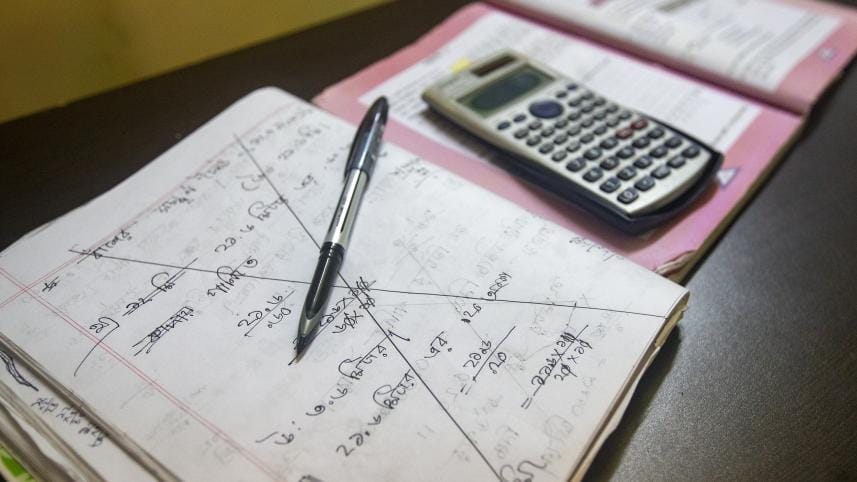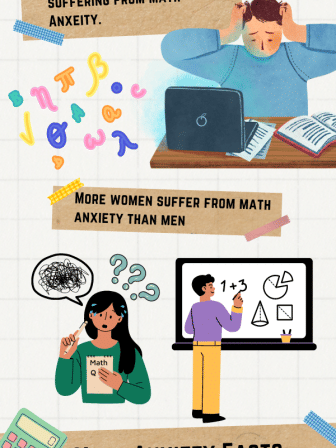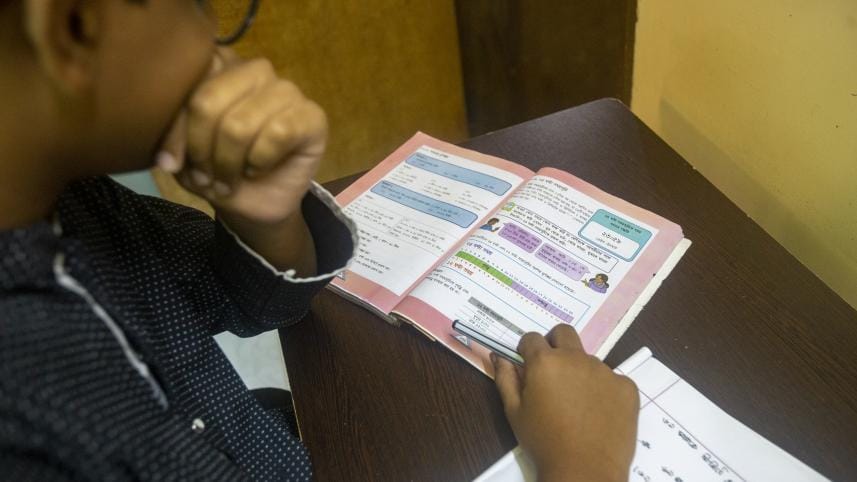The complex roots of maths anxiety

Imagine having a panic attack right in the middle of an exam because you're already worried about the consequences you're going to face once the results get published. You see your classmates and friends solve mathematical problems with ease while you struggle to perceive how to approach the problem in the first place, despite putting in effort. The continuous psychological stress, anxiety attacks the night before an exam, fear of letting your parents down and the inferiority complex that follows – all of these are related to "Maths Anxiety", a problem heavily persistent among students and yet one not talked about enough.
As it stands, a good portion of the problem can be credited to the education system. In the case of something as skill-based as maths, it only makes sense for students to feel confident once they have practised extensively. Yet, even after preparing adequately, anxiety can linger.
For a student to let go of the fear, they must primarily understand the whys and the hows of the course content rather than just learning solutions to a bunch of mathematical problems. Unfortunately, that's not how mathematics is approached as a subject in our educational institutions.

"The problem lies in the way maths was presented in general to me throughout school and college," says Abdullah Al Faiaz, an undergraduate student at IBA.
"It was always about finishing the exercise and solving test papers. This monotony made me hate maths as a subject and a natural fear followed. I never understood that maths can be fun or that it can have real-life implications. In school, I used to memorise proofs of geometric theorems on the morning of the exam and dump them in the exam paper line after line, without even trying to understand what was going on. Because in our geometry classes, our teachers just wrote lines after lines on the blackboard rather than teaching us how to approach a particular geometric problem and developing our geometric intuition," he says.
Our culture has an unhealthy fixation with grades in mathematics and it often defines merit using grades in maths as a core parameter. Students are shamed by their teachers, classmates and even their parents due to poor grades in mathematics whereas their expertise in other subjects is overlooked. Some teachers often project their impatience with explaining topics by either only brushing past concepts or making demoralising remarks when someone failed to grasp new ideas. Consequently, students' communication with them becomes limited to only vigorous head nodding while copying sums off the board.
Anha Zarin Alif, a tenth grader studying at Sir John Wilson School says, "Maths can be one of the hardest or easiest subjects depending on the way it's taught."
"I once had one of my school maths teachers make me feel deeply insecure by saying that there was no point in me trying to solve my practice sums because I would inevitably fail. That incident was a pivotal point for me in trying to improve," she recalls.
"I had a home tutor and often he used to look down on me with a hint of sarcasm in his voice in regards to my difficulties regarding maths while flaunting his own achievements," said Laiba Tabassum, an undergraduate student at BRAC University.
"In my house, there's a likelihood of being tagged as dumb if you're not good in maths or science," says Radiah Tasnim, a student of Viqarunnisa Noon College.
"Given that I have two elder sisters who're very good at maths, the pressure was always persistent regarding my maths grades. From my parents' point of view, subjects which aren't science-based are considered easy and thus not a standard of smartness. My father's an engineer himself and his being good at mathematics created this expectation that all of his kids should be good in maths as well. Otherwise, it would be shameful for him," she says.

Tales of strict maths teachers are prevalent in our culture. Some teachers often pay attention to the process followed in solving the problem rather than the solution, which makes the subject more rigid to the students.
"We had this teacher in school who only accepted answers only if we followed his methods or otherwise, he'd deduct numbers," says Laiba. "Why do we have to follow rules so strictly? If I'm correct, I should deserve those marks. And apart from that, a single silly mistake can cost you a lot of marks in maths and so the stakes are higher which makes it even scarier. But in other subjects, you always have the freedom to argue about your justification for the answer and take creative approaches in analysing your answer."
To make matters worse, many schools put a heavy emphasis on the need to finish a certain number of chapters or the coursebook. This sense of urgency results in important or basics being covered superficially leaving them with a weak foundation in the subject. It becomes harmful in the long-term during tests as students find it difficult to tackle harder problems while being under a time constraint.
Sayeda Lima, a student of Mastermind English Medium School says, "Previously, I would get blamed for not paying enough attention in trying to understand maths but now I think in earlier grades, our teachers could have focused more on building the basics rather than rushing to finish the syllabus."
"Our maths teacher finished 7 chapters of a topic as crucial as calculus within just 2 days," says Radiah.
As the importance is shifted more and more towards completing the syllabus within a time constraint rather than building the basics of a subject, the fear naturally increases.
Monir Hossain Khan has been teaching mathematics to O and A-level students for 18 years. He says, "Many students often begin to fear maths due to their surroundings or peers' influence. The school's way of teaching also has a lot to do with this. In order to fix the problem within the students, they need to change their mindset and focus on building a habit of practising maths on a daily basis."
Dr Jashodhan Saha, currently a faculty at United International University who has done his PhD in Maths Anxiety, explains, "Students can often find themselves becoming victims to the 'vicious cycle'. The vicious cycle starts due to a past bad experience during an exam. The anticipation of this negative experience repeating itself causes students to become more stressed which results in them performing poorly and thus continuing the cycle."

However, for such students, all hope is not lost.
According to Dr Jashodhan Saha, one way to tackle this issue is by providing the students, their parents, and school teachers with proper counselling and guidance. His belief in this method seems to have paid off as he has been able to measure significant improvement in students who have been introduced to this. He says, "It may take some time but for anyone diagnosed with this persistent fear of maths, the best solution would be to break this vicious cycle by helping students overcome their existing negative associations with this subject."
Despite our fixation with grades in mathematics, the poor approach to mathematical education in our country ends up sucking all the joy out of the subject. This fear makes many students shift their core to less maths-concentrated ones in university. Most parents don't even acknowledge the anxiety regarding maths to be real and consider it to be a mere excuse on the child's part. While students, parents and teachers need to realise that the problem is real and work together for the remedy, the curriculum must be revised to make the subject more application-oriented and less rigid in its approach.
Irina is a big fan of the horror genre and would love for you to send her your most nightmare-inducing maths exam stories at jahanirina05@gmail.com
Remind Ifti to be quieter at hasiburrashidifti@gmail.com



 For all latest news, follow The Daily Star's Google News channel.
For all latest news, follow The Daily Star's Google News channel.
Comments